
Alphabetical Menu
Chronological Menu
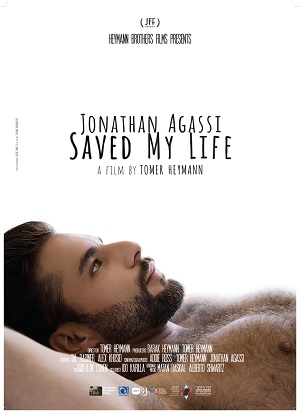
In Jonathan Agassi Saved My Life, director Tomer Heymann follows Jonathan Agassi, a Israeli gay porn star, for 8 years while showing his high points, low points and everything in between. Agassi rose to fame in the gay porn industry while working a side hustle as an an escort. He splits his time between Berlin and Israel, where his mother and younger sister reside. As sociologist Erving Goffman once wisely observed, everybody has a life frontstage and a life backstage. In this documentary, Agassi's curtain is pulled open completely while Heymann provides the audience with a glimpse of his life behind-the-curtain. Agassi is not only a porn star/escort, but also a son, a brother and, first and foremost, a human being. Heymann is very lucky to have him as a documentary subject because he's so candid, complex and fascinating. It's Agassi's emotional nakedness in front of the camera that makes him brave and compelling. Jonathan Agassi Saved My Life isn't just about about his struggles to find happinness in the porn/escort industry; it's also about his childhood trauma, drug addiction and dysfunctional relationship with his abusive father who enabled female adult to sexually abuse him. Agassi briefly reunites with to give him another chance. His relationship with his mother is also complicated and doesn't seem very healthy either, but he communicates with her regularly. At times, the film is hard to watch because director Tomer Heymann doesn't shy away from showing Agassi at his darker moments while he's suffering. Fortunately, director Tomer Heymann doesn't judge him nor does he ask the audience to. Instead, he shows empathy and compassion toward him by humanizing him, warts and all, without sugar-coating anything.There's one off-the-wall question, though, when he asks Agassi if he would want to have sex with himself which, of course, he answers "No" to. A more profound question, which remains up to the audience to answer, is what Agassi thinks of himself and to what extent he sees himself as a human being. As Pablo Neruda once wrote, "They can cut all of the flowers, but they can't stop the spring from coming." Others have cut Agassi's flowers, but, as can be seen from this doc, he cuts his own flowers too, in a way. It's too sad that Agassi doesn't have any good role models to help him tend the garden of his soul so that all the flowers can fully bloom. There's a brief mention of how he escaped the porn industry and now works as a supermarket manager, but it's too brief. Why not let the audience see some of Agassi's new life and joys? Bravo to Agassi for baring his heart, mind and soul to the audience in Jonathan Agassi Saved My Life and for director Tomer Heymann for allowing him to do so. At a running time of 1 hour and 46 minutes, it's a brave, honest, engrossing and unflinching documentary. It opens at Village East by Angelika. 
In Jazz Fest: A New Orleans Story is a lively and captivating documentary about The New Orleans Jazz and Heritage Festival which held its 50th Anniversary in 2019. Co-directors Frank Marshall and Ryan Suffern capture the culture, history, food and music that are all celebrated in the annual festival. If you weren't at the festival back in 2019 or even if you're unfamiliar with it, don't worry because Jazz Fest makes you feel like you're there to experience it all. There's plenty of footage from the live performances as well as interviews which give you a sense of what makes the festival so significant and iconic. Hearing and seeing Earth, Wind, and Fire, Jimmy Buffett, Herbie Hancock among many others is pure joy to behold. The festival had obstacles to go through, i.e. Hurricane Katrina and the pandemic, but it persevered. Amazingly, the festival has always been built entirely by hand right on the spot, so after Hurricane Katrina, it was rebuilt in exactly the same way. Fortunately, the festival returned this year after a 2 year hiatus in 2020 and 2021 during the pandemic. At a running time of just 1 hour and 34 minutes, Jazz Fest is an electrifying, illuminating and enormously entertaining documentary. It opens at Regal Union Square and AMC/Loews Lincoln Square via Sony Pictures Classics, and would make for a great double feature with the recent doc Take Me to the River: New Orleans and last year's Summer of Soul.
Firestarter 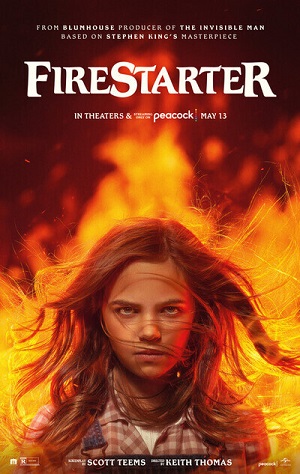 Andy (Zac Efron) and his wife, Vicky (Sydney Lemmon), have an 11-year-old daughter, Charlie (Ryan Kiera Armstrong) with pyrokinetic powers that can burst objects into fire. She used to be able to control her superpower, but she's no longer able to and gets herself into trouble at school. Meanwhile, a mysterious federal agent, Rainbird (Micheal Greyeyes), wants to take Charlie away from her parents. Very little actually works in Firestarter. The screenplay by Scott Teems begins promisingly enough by a prologue that explains how Andy and Vicky participated in a medical study during their college days that led to Andy to have telepathy and Vicky to have telekinesis. Years later, their daughter, Charlie has pyrokinesis while Andy uses his psychic powers as a therapist who stops people from wanting to smoke. Clearly, that family is far from normal. The main problem with Firestarter, though, comes from its lazy, lifeless screenplay that treats its characters like pawns in a plot that lacks thrills and suspense. It doesn't work as a thriller, as a horror film, action film, sci-film film nor as a drama. If the audience doesn't care about the plot or the characters, what else is there left to care about? The relationships between Charlie and her mother and father remain underexplored, and that the villains are bland and forgettable. Charlie even seems like a villain at times because of how she uses her superpower to kill or hurt others including a cat that she burns alive. Worst of all, the dialogue often sounds stilted which makes it even harder to be invested in the story. Also, there's not nearly enough comic relief. Perhaps if Firestarter either took itself more seriously or, through campiness and dark comedy, less seriously, it would've at least been a guilty pleasure instead of such an underwhelming disappointment. The performances are mediocre at best with Zac Efron giving a very wooden performance. To be fair, he and the other actors are undermined by the weak screenplay. The CGI and practical effects are nothing to write home about, but the opening credits sequence is quite stylish. The best quality, though, is the music score, although it becomes overbearing at times. The editing often feels choppy and the pace moves along too fast at times without letting any of the scenes breathe a little for a change. Just when you think Firestarter can't get any messier, the third act comes along to prove you wrong and leave you with a bad aftertaste. At a running time of 1 hour and 34 minutes, which feels more like 3 hours, Firestarter is a dull, lackluster bore low on thrills, chills and suspense. You'd never think that it's actually based on a novel. 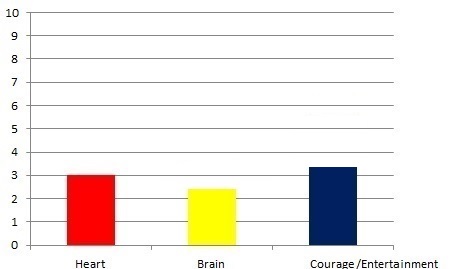 Foxhole 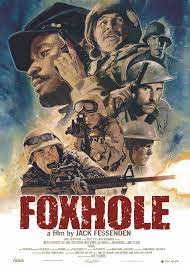 Soldiers in three different wars, the American Civil War, World War I, and the Iraq War, fight for their lives. In the American Civil War, Jackson (Motell Gyn Foster), an injured buffalo soldier, seeks refuge in a foxhole where other soldiers, Wilson (James Le Gros), debate whether or not to bring him to a hospital a few miles away. During World War I, the soldiers capture a German soldier (Alex Breaux). Morton (Alex Hurt), Jackson and Wilson must decide whether or not to kill him. In the Iraq War segment, U.S. marines, including Gale (Andi Matichak), are stuck together in a Humvee with gunfire around as they struggle to make it out alive. Foxhole is an inventive approach to combining three war films together. The screenplay by writer/director Jack Fessenden spends roughly 30 minutes during each chapter of war with characters who have the same names played by the same actors, but in different roles. He structures the film linearly beginning with the Civil War and Ending with the Iraq War. Each war story comes with various levels of tension with the Iraq War segment being the most intense one. Each of the segments could have easily been expanded into their own film. Unfortunately, none of the characters are really fleshed out enough for you to care about them as human beings. Fessenden throws the audience right into the midst of their battles with no flashbacks and very little exposition. That simple approach makes the film easy to follow, but rather shallow and oversimplified. The third segment is reminiscent of The Hurt Locker, although not nearly as powerful or searing. The performances are fine all across the board, with a few actor giving monologues that feel poignant, but the poignancy comes from their performance, not from the screenplay. What's wrong with stopping to get to know some of these soldiers? Don't they have families and other loved ones who they've left at home? The screenplay doesn't really give the solid actors enough to work with. Foxhole's best quality, though, is its cinematography which changes during each war segment while adding some style and little substance. That's not enough substance to compensate for the vapid screenplay that really say anything surprising or profound about war. Is the film trying to say that wars are all essentially the same? If so, it barely scratches the surface of that theory. At a running time of just 1 hour 34, rather short for 3 war films, Foxhole is mildly engaging and well-acted with stylish cinematography, but ultimately shallow while failing to pack an emotional punch. 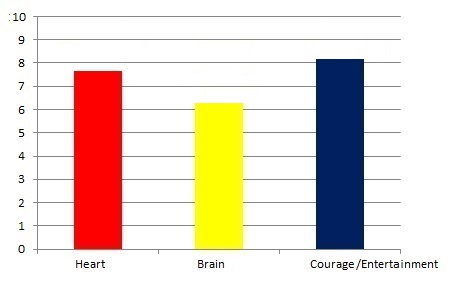 Il Buco 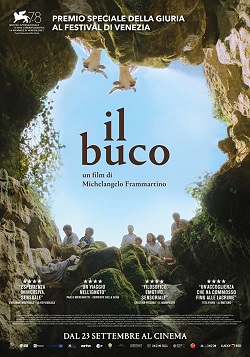 In 1960s Italy, a group of speleologists slowly descend Bifurto Abyss, a 700-foot cave that had not yet been explored. Meanwhile, an elderly, ailing man (Antonio Lanza), who works as a shepherd goes missing. Based on the true story of the 1961 exploration of Bifurto Abyss, the screenplay by writer/director Michelangelo Frammartino and co-writer Giovanna Giuliani eschew conventionality by eschewing a complex plot, characters and even dialogue. They trust the audience's intelligence to decipher the meaning of what they're watching and to connect, on their own, the story of the shepherd with the experiences of the speleologists. None of the people onscreen are named. There are no backstories, narration, or exposition. The only expositional text comes at the very end before the end credits roll. There's a lot going on if you're paying attention and are willing to absorb sights and sounds. It's a truly immersive experience that's hard to put into words. Words aren't really necessary in a quiet, meditative film like this. Part of what makes it even more engrossing is that it feels like a documentary without any scenes that would make you think that you're watching actors. The filmmakers capture an authenticity that makes for an occasionally exhilarating experience, especially the scenes of the cave exploration. They grasp the fact that there are many ways to communicate with the audience, not just through dialogue. The visuals alone in Il Buco are worth watching the film for. Frammartino finds poetry in the many breathtaking shots. He trusts the audience's patience which definitely will be a frustrating experience for those of you with a short attention span who prefer a fast pace. The pace moves slowly which feels very refreshing and relaxing. There are no big action scenes or huge twists, even though there is a subplot involving the elderly shepherd's disappearance. Frammartino's greatest strength, though, is his ability to take what sounds mundane and turn it into something rich and profound. Seemingly simple shots like of a soccer ball being kicked above the opening of the cave are among the most hauntingly beautiful moments. Yes, Il Buco requires a lot of patience, but patience is often rewarding which can be said about this film. It's also worth mentioning the terrific sound design that helps to make it even more immersive. If Il Buco were 3 hours long, it would've overstayed its welcome, but at a running time of 1 hour and 87 minutes, Frammertino shows restraint, another important strength of his. It's an awe-inspiring, transcendent, refreshing and visually poetic experience. Il Buco would be an interesting double feature with Cow, Hukkle, or Le Quattro Volte. 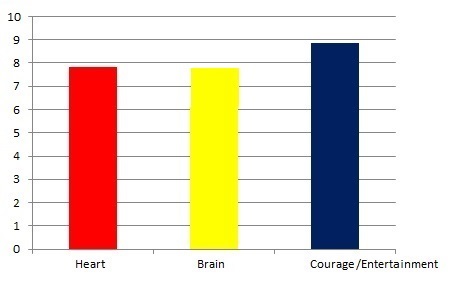 The Innocents 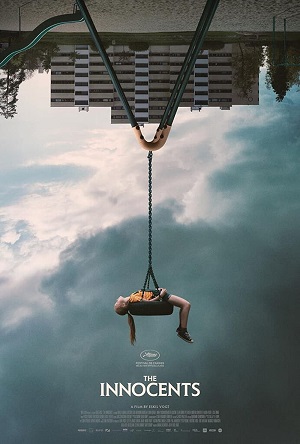 Ida (Rakel Lenora Fløttum), a young girl, moves into a new apartment with her mother (Ellen Dorrit Petersen), father (Morten Svartveit), and older sister, Anna (Alva Brynsmo Ramstad). She meets Ben (Sam Ashraf) at a playground and discovers that he has telekinetic superpowers. He teaches her how to harness her own telekinetic superpowers. They befriend Aisha (Mina Yasmin Bremseth Asheim), another girl from the neighborhood, who lives with her mom (Kadra Yusuf) and also learns telekinesis. Soon, their use of telekinetic powers goes too far and gets them into trouble. Writer/director Eskil Vogt combines horror, thriller, sci-fi and coming-of-age drama in a way that would've been tonally uneven and clunky with a less sensitive screenplay. He keeps the exposition to a minimum while letting the audience come to their own conclusions about where the children's superpowers come from and whether or not it symbolises something metaphorically. It's fundamentally a story about human nature. As The Exorcist's director William Friedkin once told me in an interview, what makes dark themes so compelling is the tug of war between good and evil. That's precisely what happens in The Innocents. The kids' superpowers can be used for good or for something more sinister. They look innocent to their parents who don't give them much attention or supervision. Are the parents to blame for their children's actions? Can the children learn the difference between right and wrong on their own? Can they learn how to understand the consequences of their actions? It doesn't seem like they do based on their behavior. What they do to a cat won't be spoiled here, but it says a lot about what happens when adults don't supervise their own kids enough. Fortunately, the horror and sci-fi elements aren't overdone nor does the film go over-the-top in the surprisingly understated and provocative third act. Although The Innocents is a horror film, it doesn't rely on gore, CGI effects of jump scares to scare the audience. The horror is much more of the psychological kind and even more disturbing because the kids look like angels one minute, but bad seeds the next when they're away from their parents. The CGI and practical effects that are used, though, look impressive. There are a few very eerie and atmospheric shots, i.e. when the camera pans the outside of the apartment complex upside down. It's even more effective than the upside-down tracking shot in the opening scene of last year's Candyman. The child actors are all superb, especially Rakel Lenora Fløttum who's just as radiant as Haley Joel Osment is in The Sixth Sense. Vogt moves the film along at a slow, but not too slow pace which allows for the audience to gradually become more absorbed in these characters' lives and in the increasingly complex narrative. At a running time of just under 2 hours, The Innocents is one of the creepiest, powerful and heartfelt psychological horror films since The Sixth Sense.
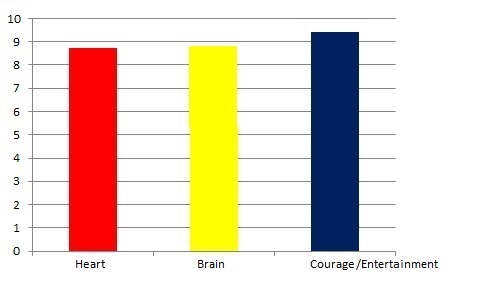 Montana Story 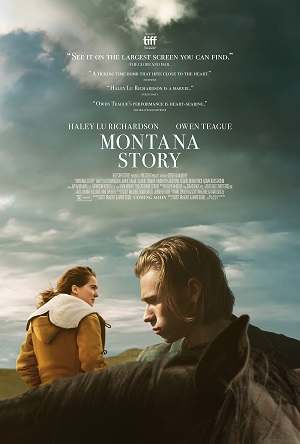 Cal (Owen Teague), a young man, returns home to his family's ranch to deal with the estate of his dying father who lays comatose at home after suffering a stroke. He reunites with his father's longtime housekeeper, Valentina (Kimberly Guerrero), and meets his father's nurse, Ace (Gilbert Owuor), an immigrant from Kenya. When his estranged half-sister, Erin (Haley Lu Richardson), shows up unexpectedly, she's unhappy to learn that he plans on putting the family's precious horse down. She also reawakens both of their memories of of their childhood trauma. The screenplay by co-writers/directors Scott McGehee and David Siegel treats its characters like human beings from the very beginning. They allow the audience to gradually get to know Cal and Erin and to learn about their emotional pain that comes from a traumatic event from the past. For example, when Cal first sees Erin as she arrives at the ranch, there's a long pause. The way that he talks to her speaks volumes about their relationship. You don't know right away what led Cal and Erin to become estranged or why they're angry at their father, but eventually you do through the well-written exposition that keeps you in just the right amount of suspense. Cal has a scene where he opens up emotionally to Ace who's compassionate enough to listen to him. It's one of the film's most powerful and poignant scenes because the emotions that Cal bottled up and suddenly expresses feel real. There's no melodrama or schmaltz throughout the film. With a less sensitive screenplay, it could've turned into a contrived soap opera. Instead, it's as nuanced, understated and moving as Ordinary People. The relationship between Cal and Erin also feels authentic thanks to the well-written screenplay, i.e. the true-to-life scene as they talk in the car while on the way to buy a pick-up truck. The way that their relationships evolve and how they experience epiphanies feel organic, especially during the sweet and refreshingly un-Hollywood third act. Owen Teague gives the best performance of his career. He handles the emotional complexities of his role very convincingly. Even though you learn very little about Cal's life beyond his childhood trauma, he still manages to be a fully-fleshed human being. You can sense that he hasn't been able to talk to anyone about his emotional pain before and that he feels some sort of catharsis by talking about it to someone who's willing to listen to him. Teague finds Cal's emotional truth which is what makes his performance transcendent. The same can be said about Haley Lu Richardson who has a moving scene in the third act as Erin finally gets to put her emotions to words, too. Whether or not Cal and Erin will fully heal from their trauma remains up to the audience to interpret, but it's certain that their healing has begun as they acknowledge their emotional wounds without ignoring the pain that comes from those wounds. As the poet Pablo Neruda once wisely wrote, "They can cut all of the flowers, but they can't stop the spring from coming." Hopefully, new flowers will begin to grow for Cal and Erin as they heal. It's also worth mentioning the picturesque landscape which provides levity, by relaxing one's mind, as well as some visual poetry. The pace moves along slowly, but not too slowly--just enough for the audience to get absorbed by the story without any scenes that drag. Kudos to the filmmakers for trusting the audience's patience which is rare these days. At a running time of 1 hour and 53 minutes, Montana Story is a warm, wise and genuinely heartfelt emotional journey. It would make for an interesting double feature with The Skeleton Twins. 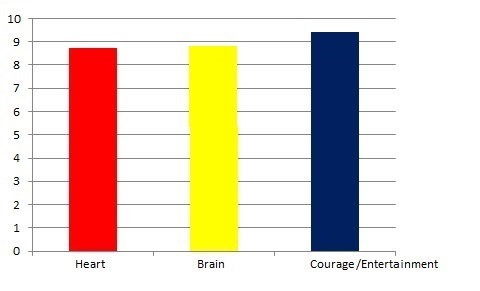 On the Count of Three 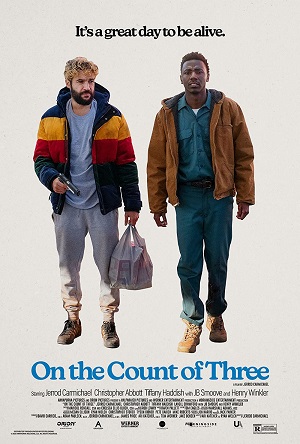 Val (Jerrod Carmichael) and helps his childhood friend, Kevin (Christopher Abbott), to escape from a psych ward after he attempted suicide a few days earlier. He's suicidal just like Kevin, so he makes a pact with him to shoot each other behind a building on the count of three. It doesn't go as planned, though, so they agree to wait until the end of the day to do it instead. Meanwhile, they seek revenge on the people who abused them in the past. Kevin wants to kill the psychologist, Dr. Brenner (Henry Winkler), who abused him as a child. Val, who broke up with his ex-girlfriend, Natasha (Tiffany Haddish), recently, wants to confront his abusive father, Lyndell (J.B. Smoove). Co-writers Ari Katcher and Ryan Welch understand the concept that comedy is rooted in tragedy. That's evident in their attempt to mine dark humor from a premise that deals with heavy issues like child abuse, depression and suicide. Unfortunately, the comedic beats don't land. In Bruges also dealt with the same topic of suicide and combined dark comedy, but in a much more effective way because it's actually funny and witty. The Perks of Being a Wallflower handled the themes of child abuse, depressed and suicide with much more emotional depth. On the Count of Three lacks both wit and emotional depth. Too many of the dark comedy attempts fall flat. Both Val and Kevin come across as unpleasant, rude, and obnoxious human beings with very few redeeming qualities. The abuse that they suffered in the past does not excuse them for their actions. Also, their character arc feels contrived, especially Val's. After everything he's been through, the cop-out ending with him and his ex-girlfriend feels rushed and too much like a fairy tale. You don't even get to hear what they talk about. Why not let the audience in on their conversation? That ending seems more like a dream than anything that resembles reality. How has Val really changed as a person? Why not allow the audience to see that change more gradually? Then there's the clunky flashbacks as Kevin remembers his traumatic past involving Dr. Brenner. The Perks of Being a Wallflower did a much better job of incorporating those kind of flashbacks to tug at the audience's heartstrings in a way that felt organic and understated, unlike in On the Count of Three which goes over-the-top. The performances are decent, but nothing exceptional which could have something to do with the screenplay that doesn't breathe enough life into the characters. There's not enough nuance to their performances, and it's not help that their characters are increasingly grating, like nails on a chalkboard. Without a strong screenplay, it's hard to feel the chemistry between Val and Kevin. They're supposed to be lifelong friends, but that's not something that feels palpable to the audience. The editing, especially during the flashback scenes, is awkward and distracting. On a positive note, the running time is only 1 hour and 27 minutes, so at least it's not bogged down by the weight of its running time. Ultimately, On the Count of Three is a clunky, shallow and contrived dark comedy with not enough laughs, wisdom or emotional depth.
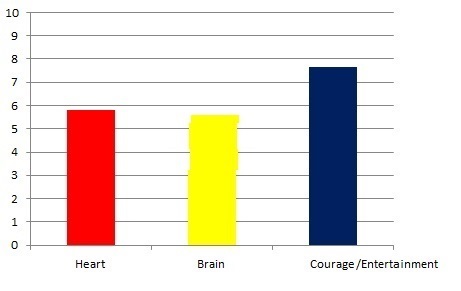 Pleasure  Bella Cherry (Sofia Kappel) moves from Sweden to Los Angeles hoping to become a popular porn star. She hires an agent, Mike (Jason Toler), starts her own Instagram page, and moves in with a roommate, Joy (Revika Reustle), who also works as a porn star. She and Joy become friends as they both try to find success in an industry that, as Bella finds out through experience, is abusive toward women. Pleasure serves as a cautionary tale about greed, fame and ego, and about an industry that blurs the line between rape and consent. The screenplay by writer/director Nina Thyberg and co-writer Peter Modestij is an unflinching and heartfelt character study. Bella comes to L.A. with no experience in the porn industry; just dreams, hopes, desires, a very high libido and naivete. Little does she know that the contract she signs is essentially a Faustian bargain and that she's unprepared for what she's about to experience on an emotional level. Although the porn industry dehumanizes Bella, Pleasure sees and treats her as a human being because the screenplay shows her vulnerability, sadness and frustration. Concurrently, the filmmakers don't villainize anyone, even the two male porn stars who made Bella feel violated. They understand that very few things in life are black-and-white. There's more than one side to every story, so you get to hear what Bella's agent thinks about what happened to her during a porn shoot and to see how the male porn stars react. She has boundaries, but she did claim that she's willing to have rough sex which includes degredation. The filmmakers could've easily turned Pleasure into a revenge tale, but they show restraint by not veering into that territory. Instead, they focus on Bella's epiphanies as she discovers harsh realities. In a way, she's like in a prison or like a lobster in a pot of boiling water. Whether or not she makes it out of the boiling pot of water won't be spoiled here, though, but that's a part of what makes Pleasure such a compelling film. Sofia Kappel gives a raw, bravura and heartfelt breakthrough performance. There are plenty of sexually graphic scenes and nudity, and some that might be shocking to some, but that's the point. Sofia Kappel is truly brave not for showing her physical nakedness, but ffor bearing her naked emotions on screen. She's fortunate to have a screenplay that provides a window into Bella's heart, mind and soul for the audience to peer into. Fortunately, she helps to bring Bella to life to make her more than just a porn star. She's a human being just like everyone. She calls her mother in Sweden every now and then to check in with her, although she's not honest about what she's really up to in L.A. Writer/director Ninja Thyberg and co-writer Peter Modestij don't ask you to judge Bella, just to see her as a human being and to have empathy for her which comes easily because they show empathy toward her through the sensitive and perceptive screenplay. At a running time of 1 hour and 49 minutes, Pleasure is a provocative, tender and unflinching Faustian tale. 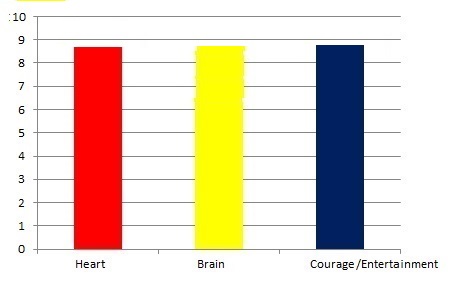 Private Property 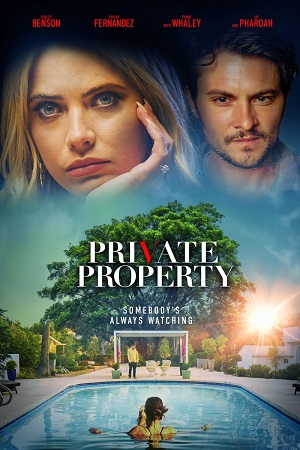 Kathryn (Ashley Benson), an aspiring actress, is stuck in a stale marriage with her husband, Richard (Jay Pharoah), a film producer. When her gardener gets arrested for being an illegal immigrant, Ben (Shiloh Fernandez), arrives at her door announcing that he's her new gardener. He tries to seduce her and introduces her to Ed (Logan Miller) who claims that he's her neighbor and that he works in Silicon Valley. Little does she know that Ben and Ed are trying to con her and have ulterior motives. The screenplay by writer/director Chadd Harbold and co-writer Leslie Stevens, based on the 1960 film, spends too much time on exposition before getting to the meat of the story, Ben and Ed's con. The precise details of the con and what Ben and Ed's motive is won't be spoiled here, but the film reveals that motive rather early, so the suspense gradually dissipates afterward. Kathryn comes across as someone who's naive and not particularly bright. She lets Ben take a dip in her pool when he's all sweaty even though she barely knows him, and then there's a plot hole something that he lies to her about. Unless she's completely gullible, there's no way that she wouldn't Google his name or Ed's name or at least pay attention to the fact that he lacks gardening skills. Ben and Ed obviously see her as an easy, gullible target, but she's too gullible. Why allow the audience steps ahead of Kathryn? Even if you didn't see the original film from 1960, you'll be able to figure out the twist long before the film spoils it. Unfortunately, there aren't enough moments of thrills, even psychological ones, so the plot meanders until the intense third act that takes a bit of a nosedive because it's too contrived. The relationship between Kathryn and her husband is complex and fascinating, but the screenwriters don't explore it with enough depth. He neglects her emotionally like Shirley's husband in Shirley Valentine, so it's a shame that the film doesn't get inside Kathryn's heart, mind and soul to let the audience grasp what she's going through as a human being. She remains at a cold distance from the audience as do all of the other characters as well. There's also not nearly enough comic relief, so monotony and lethargy set in eventually.
In terms of production values, Private Property doesn't have much going for it except the production design which adds some style, but not nearly enough to compensate for the lack of substance. The cinematography and editing aren't used in ways that create any sort of atmosphere. The same can be said about the music. Sometimes lack of style can be fine if you're emotionally invested in the story or in one of the characters, but that doesn't happen in this case because of the shallow screenplay. None of the actors manage to shine, although Shiloh Fernandez does exude a little charisma. With a better screenplay, Private Property as gripping as a Hitchcockian thriller or a fun, dumb thriller like Wild Things. At least there are no bad laughs. With a running time of 1 hour and 27 minutes, which feels more like 2 hours, Private Property is an inert, meandering and vapid thriller low on both style and substance. 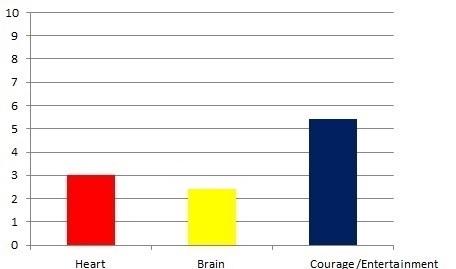 |